新概念英语第二册学习情况评估试卷及答案
- 格式:doc
- 大小:33.00 KB
- 文档页数:6
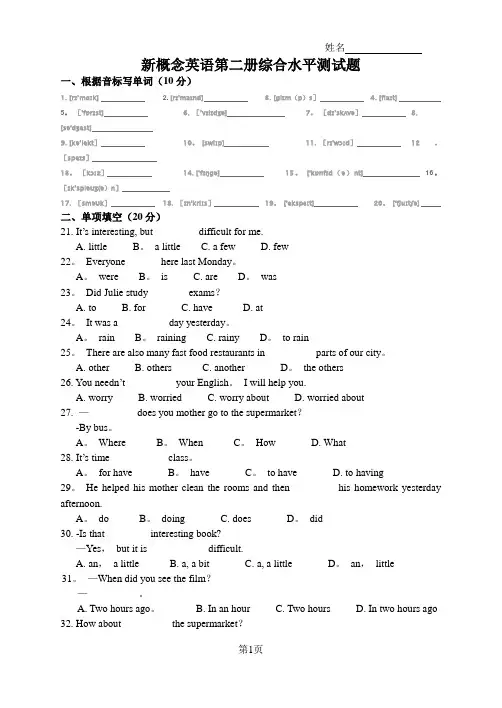
新概念英语第二册综合水平测试题一、根据音标写单词(10分)1. [rɪ’mɑːk]2. [rɪ'maɪnd]3. [glɪm(p)s]4. [flaɪt]5。
['fɒrɪst] 6. [’vɪlɪdʒə]7。
[dɪ’skʌvə]8.[sə'dʒest]9. [kə’lekt]10。
[swiːp]11. [rɪ'wɔːd]12。
[speɪs]13。
[kɔːz]14. ['fɪŋgə]15。
['kɒnfɪd(ə)nt]16。
[ɪk’spləʊʒ(ə)n]17. [sməʊk]18. [ɪn'kriːs]19。
['ekspɜːt]20。
['fjuːtʃə]二、单项填空(20分)21. It’s interesting, but ________ difficult for me.A. little B。
a little C. a few D. few22。
Everyone ______ here last Monday。
A。
were B。
is C. are D。
was23。
Did Julie study _______ exams?A. toB. forC. haveD. at24。
It was a _________ day yesterday。
A。
rain B。
raining C. rainy D。
to rain25。
There are also many fast food restaurants in _________ parts of our city。
A. otherB. othersC. another D。
the others26. You needn’t _________ your English。
I will help you.A. worryB. worriedC. worry aboutD. worried about27. —_________ does you mother go to the supermarket?-By bus。
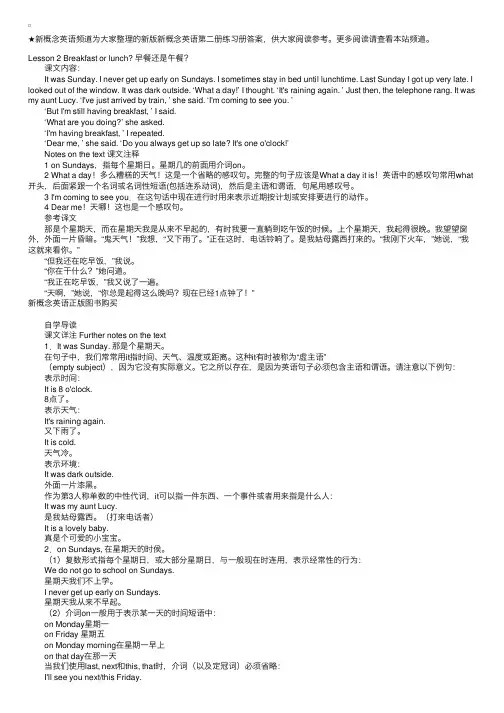
★新概念英语频道为⼤家整理的新版新概念英语第⼆册练习册答案,供⼤家阅读参考。
更多阅读请查看本站频道。
Lesson 2 Breakfast or lunch? 早餐还是午餐? 课⽂内容: It was Sunday. I never get up early on Sundays. I sometimes stay in bed until lunchtime. Last Sunday I got up very late. I looked out of the window. It was dark outside. ‘What a day!’ I thought. ‘It's raining again. ’ Just then, the telephone rang. It was my aunt Lucy. ‘I've just arrived by train, ’ she said. ‘I'm coming to see you. ’ ‘But I'm still having breakfast, ’ I said. ‘What are you doing?’ she asked. ‘I'm having breakfast, ’ I repeated. ‘Dear me, ’ she said. ‘Do you always get up so late? It's one o'clock!’ Notes on the text 课⽂注释 1 on Sundays,指每个星期⽇。
星期⼏的前⾯⽤介词on。
2 What a day!多么糟糕的天⽓!这是⼀个省略的感叹句。
完整的句⼦应该是What a day it is!英语中的感叹句常⽤what 开头,后⾯紧跟⼀个名词或名词性短语(包括连系动词),然后是主语和谓语,句尾⽤感叹号。
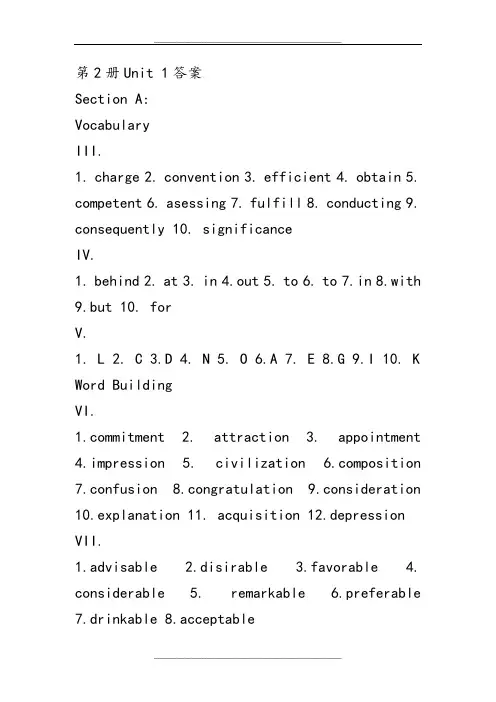
第2册Unit 1答案Section A:VocabularyIII.1. charge2. convention3. efficient4. obtain5. competent6. asessing7. fulfill8. conducting9. consequently 10. significanceIV.1. behind2. at3. in4.out5. to6. to7.in8.with9.but 10. forV.1. L2. C3.D4. N5. O6.A7. E8.G9.I 10. K Word BuildingVI.mitment2. attraction3. appointment4.impression5. civilizationposition7.confusion8.congratulation9.consideration 10.explanation 11. acquisition 12.depression VII.1.advisable2.disirable3.favorable4. considerable5. remarkable6.preferable7.drinkable8.acceptableSentence StructureVIII.1.much less can he write English articles2.much less can he manage a big company3.much less could he carry it upstairs4.much less have I spoken to him5.much less to read a lot outside of itIX.1.Having meals at home can cost as little as two or three dollars, whereas eating out at a restaurant is always more expensive.2.We thought she was rather proud,whereas in fact she was just very shy.3.We have never done anything for them, whereas they have done so much for us.4.Natalie prefers to stay for another week, whereas her husband prefers to leave immediately.5.Some praise him highly,whereas others put him down severely.TranslationX.1.She wouldn't take a drink, much less could shestay for dinner.2.He thought I was lying to him,whereas I was telling the truth.3.How do you account for the fact that you have been late every day this week?4.The increase in their profits is due partly to their new market strategy.5.Such measures are likely to result in the improvement of work efficiency.6.We have already poured a lot of time and energy into the project, so we have to carry on.XI.1.我认为他不会抢劫,更不用说暴力抢劫了.2.男工平均工资每小时10美元,而女工才每小时7美元.3.自然界的平衡一旦遭到破坏,就会带来很多不可预知的影响.4.期终考试迫在眉睫,你最好多花点时间看书.5.有趣的是,消费者发现越来越难以辨别某些品牌的原产国.其部分原因来自于全球化带来的影响,部分原因是由于产地的变化.6.最近一次调查表明,妇女占总劳动力的40%.ClozeXII.1.C2.B3.B4.A5.D6.B7.C8.D9.A 10.C 11.D 12.C 13.C 14.B 15.ASection BComprehension of the TextII.1.D2.A3.C4.D5.A6.C7.B8.BVocabularyIII.1.utilize2.reject3.considerable4.temporary5.acceptable6.recognition7.alleviate8.appreciate9.furthermore 10.interactIV.1.interact with2.gone through3.deal with4.recovered with5.adjusting to6.familiar to7.In spite of8.were tired of9.prevented from 10.came to新视野大学英语(第2版)第2册Unit 2答案Section AVocabularyIII.1.promosing2.amusing3.lowered4.persisted5.rank6.swear7.unfair8.presence9.frowning 10. approximatelyIV.1.on2.upon3.on4.in5.by6.to7.in8.of9.on 10.outV.1.O2.K3.D4.H5.J6.E7.M8.G9.B 10.A Word BuildingVI.1.observe - observer:one who observes a person or an event2.ski - skier: one who skis3.visit - visitor:one who visits somebody or some place4.learn - learner:one who learns something5.report - reporter:one who reports on persons or events for a newspaper6.drink - drinker:one who often drinks alcohol,esp. too muchVII.1.tropical2.musical3.occasional4.environmental5.global6.dangerous7.natural8.central Sentence structureVIII.1.They didn't lose heart despite of lots of frustration.2.Despite the heavy rain,the boys played football in the yard all afternoon.3.I will try my best despite the slim chances of success.4.Despite a thorough search for the escaped prisoner in the mountain,no sign of him was found.5.Despite their increased income,their life became poorer because of the rising prices. IX.1.nor do I think it necessary to do so2.nor would they go to my sister's3.nor do we have her telephone number4.nor would I like to go to work immediately5.nor would I TranslationX.1.Despite the fact that she is the only child in her family, she is never babied by her parents.2.Mike didn't come to the party last night, nor did he call me to give an explanation.3.The person sitting next to him did publish some novels, but he is by no means a great writer.4.He has no interest in football and is indifferent to who wins to loses.5.The manager needs an assistant that he can count on to take care of problems in his absence.6.This is the first time that he has made a speech in the presence of so large an audience. XI. 1.尽管那项计划一开始就证明是不切实际的,但是他们还是坚持要实施.2.我无法说服他接受这项计划,也无法使他认识到这项计划的重要性.3.你是怎么把那么多东西塞进这个小行李箱的?4.别人对他怎么看,他全不在意.5.我能否指出你犯了个小错误.6.他母亲让他开车慢一点儿,但是他从不把她的话放在心上.ClozeXII.1.B2.D3.B4.C5.B6.C7.A8.A9.B 10.D 11.B 12.D 13.B 14.C 15.DSection BReading skillsI.1.D2.A3.A4.C5.BComprehension of the TextII. 1.D 2.B 3.C 4.D 5.A 6.C 7.A 8.BVocabularyIII.1.sake2.sacrificed3.crack4.pursuing5.explosive6.overcome7.indicated8.opponents9.stripped 10.deniedIV.1.Natasha made herself stand out in the group interview by acting as the leader in her group.2.To be successful,you need a careful plan,good luck,help at the right time,and above all,hard work.3.They are not doing this to gain recognition or money;they are doing this for the sake of society.4.It was actually what he said rather than what he did that made me sad.5.Once my mother sets her mind on something,it will be very hard to stop her.6.Years of research had set the stage for their success in their field.7.Local people are used to the phenomenon,so they are not surprised at all.8.Today at this meeting we are going to focus on the question of air pollution.9.He never expected that his best friend would charge him with cheating in the exam.10.His parents were so strict with him in his studies that he had little time to participate in any activities outside of class.新视野大学英语(第2版)第2册Unit 3答案Section AVocabularyIII.1.mutual2.illusion3.canceled4.overlooked5.proceeded6.resolve7.prejudicepromise9.confirm 10.subsequentlyIV.1.having nothing to do with2.taking care of3.met with4.on the surface5.work out6.incompatible with7.ups and downs8.learned of9.indication of 10.all alongV.1.M2.L3.F4.D5.H6.O7.A8.C9.I 10.K Word BuildingVI.1.shopping2.feeling3.storage4.cooking5.ending6.beginning7.gathering8.removal9.arrival 10.passage 11.writing 12.marriageVII.1.relationship2.citizenship3.leadership4.membership5.boyhood6.livelihood7.brotherhood8.authorship9.adulthood10.neighborhood 11.wisdom 12.ownership Sentence structureVIII.1.It is never too bad for us to do something about the situation.2.One is never too old to learn.3.It is never too late for you to put a stop to this madness.4.It is never too late for you to mend your ways.5.His income was never too small to support his family.IX.1.My best friend,Anna,was here last night.2.The company manager,Mr. Madison,gathered his staff and announced the decision.3.You should have seen an ophthalmologist, an eye doctor.4.He sent for the accountant,the most experienced person in accounting.5."Leave it to me," said David,the man on night duty.TranslationX.1.You are never too experienced to learn new techniques.2.There remains one problem,namely,who should be sent to head the research there.3.Their relationship did meet with some difficulty at the beginning because of cultural differences.4.Though he has had ups and downs,I believed all along that he would succeed someday.5.I have some reservations about the truth of your claim.6.She isn't particularly tall,but her slim figure gives an illusion of height.XI.1.应尽早告知年轻人:必须认真对待法律.2.他现在面临一个重要决定,这个决定可能会影响他的整个前程.3.即使在情况最糟糕的时候,你也必须保持镇静和信心.4.人际关系的成功与否与双方相处是否融洽以及交流是否顺畅有很大关系.5.他受到袭击,身受重伤,随后不治而亡.6.他的举止至少在表面上像个正常人。
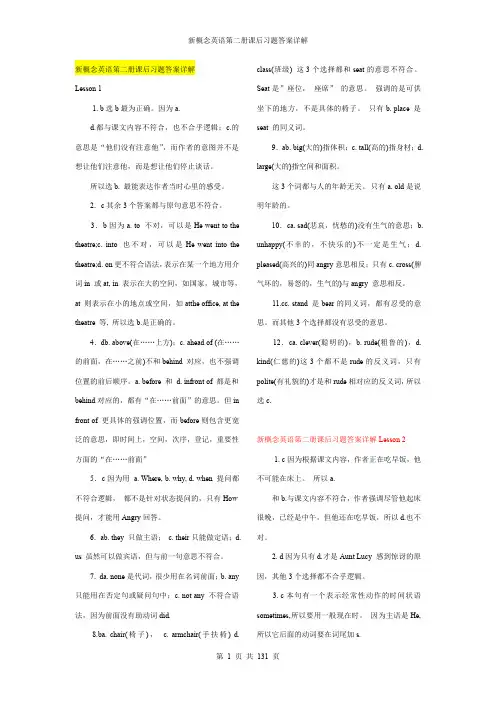
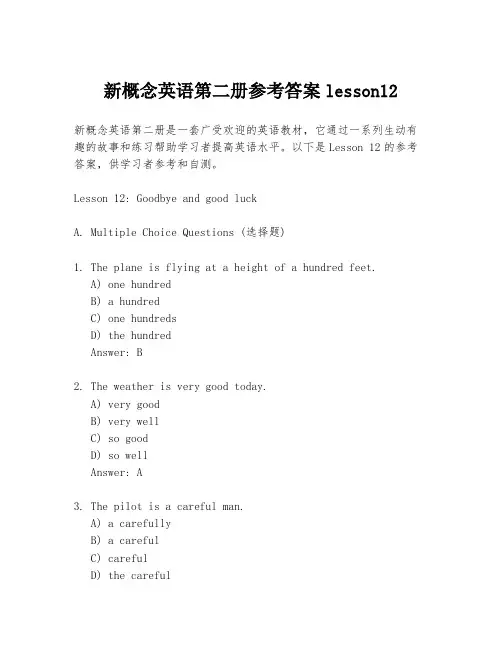
新概念英语第二册参考答案lesson12新概念英语第二册是一套广受欢迎的英语教材,它通过一系列生动有趣的故事和练习帮助学习者提高英语水平。
以下是Lesson 12的参考答案,供学习者参考和自测。
Lesson 12: Goodbye and good luckA. Multiple Choice Questions (选择题)1. The plane is flying at a height of a hundred feet.A) one hundredB) a hundredC) one hundredsD) the hundredAnswer: B2. The weather is very good today.A) very goodB) very wellC) so goodD) so wellAnswer: A3. The pilot is a careful man.A) a carefullyB) a carefulC) carefulD) the carefulAnswer: B4. The journey across the Atlantic is very dangerous.A) very dangerousB) very dangerC) so dangerousD) so dangerAnswer: A5. The plane is making its way to New York.A) making its way toB) making its way atC) making the way toD) making the way atAnswer: A6. The passengers are waving to the pilot.A) wavingB) waveC) to waveD) waving atAnswer: A7. The pilot is waving back to the passengers.A) waving backB) wavingC) to wave backD) waving atAnswer: A8. The plane is flying over the ocean.A) flyingB) flyC) to flyD) flownAnswer: A9. The pilot is saying goodbye to everyone.A) saying goodbyeB) saying good-byeC) to say goodbyeD) saying goodbye toAnswer: A10. The weather is expected to stay fine.A) stay fineB) staying fineC) to stay fineD) stayed fineAnswer: AB. Fill in the Blanks (填空题)1. The plane is flying at a height of one hundred feet.2. The weather is very good today.3. The pilot is a careful man.4. The journey across the Atlantic is very dangerous.5. The plane is making its way to New York.6. The passengers are waving to the pilot.7. The pilot is waving back to the passengers.8. The plane is flying over the ocean.9. The pilot is saying goodbye to everyone.10. The weather is expected to stay fine.C. Rewrite the Following Sentences (改写句子)1. The plane is flying at a height of one hundred feet. →The plane is at a height of one hundred feet in the air.2. The weather is very good today. → Today's weather is very good.3. The pilot is a careful man. → The man who is piloting is careful.4. The journey across the Atlantic is very dangerous. → Itis very dangerous to journey across the Atlantic.5. The plane is making its way to New York. → The plane is heading towards New York.6. The passengers are waving to the pilot. → They are waving their hands to the pilot.7. The pilot is waving back to the passengers. → In response, the pilot is waving to the passengers.8. The plane is flying over the ocean. → Over the ocean, the plane is in flight.9. The pilot is saying goodbye to everyone. → Everyone is being bid farewell by the pilot.10. The weather is expected to stay fine. → It isanticipated that the weather will remain fine.D. Translation (翻译)1. 飞机正在以一百英尺的高度飞行。
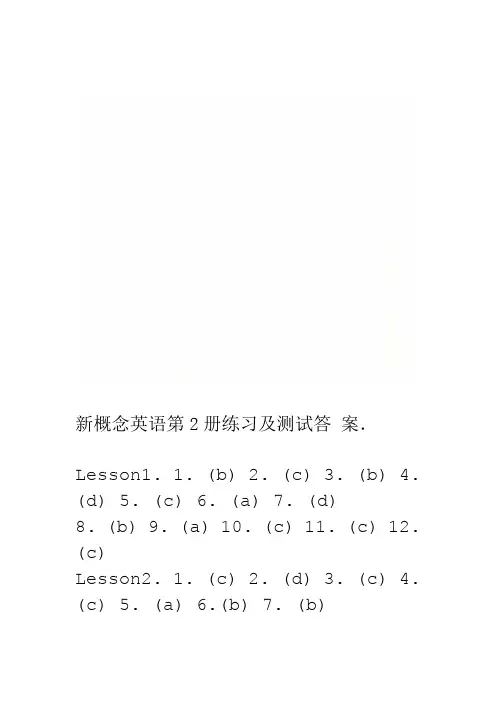
新概念英语第2册练习及测试答案.Lesson1. 1. (b) 2. (c) 3. (b) 4.(d) 5. (c) 6. (a) 7. (d)8. (b) 9. (a) 10. (c) 11. (c) 12.(c)Lesson2. 1. (c) 2. (d) 3. (c) 4.(c) 5. (a) 6.(b) 7. (b)8. (a) 9. (d) 10. (c) 11. (d) 12.(b)Lesson3. 1. (c) 2. (a) 3. (c) 4.(a) 5. (d) 6. (b) 7. (c)8. (c) 9. (b) 10. (a) 11. (b) 12.(b)Lesson4. 1. (d) 2. (b) 3. (a) 4.(b) 5. (b) 6. (a) 7. (c)8. (b) 9. (c) 10. (a) 11. (c) 12.(c)Lesson5. 1. (c) 2. (a) 3. (d) 4.(b) 5. (c) 6. (d) 7. (a)8. (b) 9. (c) 10. (b) 11. (a) 12.(d)Lesson6. 1. (d) 2. (a) 3. (c) 4.(d) 5. (d) 6. (a) 7. (d)8. (a) 9. (b) 10. (a) 11. (d) 12.(a)Lesson7. 1. (b) 2. (c) 3. (c) 4.(d) 5. (a) 6. (c) 7. (d)8. (a) 9. (c) 10. (b) 11. (a) 12.(b)(a) 5. (c) 6. (c) 7. (b)8. (b) 9. (a) 10. (d) 11. (b) 12.(b)Lesson9. 1. (b) 2. (b) 3. (d) 4.(a) 5. (a) 6. (b) 7. (b)8. (d) 9. (b) 10. (b) 11. (d) 12.(c)Lesson10. 1. (a) 2. (d) 3. (d) 4.(c) 5. (b) 6. (c) 7.(a) 8. (c) 9. (a) 10. (c) 11. (c)12. (a)Lesson11. 1. (b) 2. (b) 3. (b) 4.(a) 5. (b) 6. (c) 7.(c) 8. (a) 9. (c) 10. (c) 11. (b)12. (d)Lesson12. 1. (c) 2. (c) 3. (a) 4.(d) 5. (d) 6. (a) 7.(d) 8. (a) 9. (c) 10. (d) 11. (a)12.(a)(c) 5. (a) 6. (b) 7.(b) 8. (c) 9. (a) 10. (a) 11. (a)12. (d)Lesson14. 1. (b) 2. (c) 3. (a) 4.(c) 5. (d) 6. (b) 7.(c) 8. (b) 9. (c) 10. (b) 11. (b)12. (b)Lesson15. 1. (d) 2. (b) 3. (c) 4.(b) 5. (c) 6. (d) 7.(a) 8. (d) 9. (c) 10. (c) 11. (c)12. (b)Lesson16. 1. (a) 2. (a) 3. (d) 4.(a) 5. (b) 6. (a) 7.(d) 8. (a) 9. (d) 10. (d) 11. (d)12. (a)Lesson17. 1. (d) 2. (b) 3. (b) 4.(d) 5. (c) 6. (c) 7.(b) 8. (a) 9. (a) 10. (c) 11. (a)12. (d)Lesson18. 1. (b) 2. (d) 3. (b) 4.(d) 5. (b) 6. (c) 7.12. (b)Lesson19. 1. (a) 2. (d) 3. (c) 4.(c) 5. (d) 6. (b) 7.(c) 8. (b) 9. (c) 10. (a) 11. (c)12. (c)Lesson20. 1. (b) 2. (c) 3. (b) 4.(b) 5. (c) 6. (b) 7.(c) 8. (a) 9. (c) 10.(c) 11. (d)12. (a)Lesson21. 1. (c) 2. (d) 3. (c) 4.(d) 5. (a) 6. (c) 7.(b) 8. (b) 9. (a) 10. (d) 11. (c)12. (c)Lesson22. 1. (d) 2. (b) 3. (d) 4.(d) 5. (b) 6. (d) 7.(a) 8. (c) 9. (d) 10. (a) 11. (b)12. (b)Lesson 23. 1. (a) 2. (a) 3. (a) 4.(c) 5. (c) 6. (a) 7.12. (d)Lesson 24. 1. (b) 2. (a) 3. (a) 4.(c) 5. (a) 6. (a) 7.(c) 8. (c) 9. (c) 10. (b) 11. (a)12. (b)Lesson 25. 1. (c) 2. (b) 3. (b) 4.(a) 5. (b) 6. (c) 7.(d) 8. (b) 9. (a) 10. (a) 11. (d)12. (a)Lesson 26. 1. (a) 2. (d) 3. (c) 4.(b) 5. (c) 6. (d) 7.(d) 8. (a) 9. (b) 10. (d) 11. (b)12. (d)Lesson 27. 1. (d) 2. (c) 3. (d) 4.(d) 5. (d) 6. (b) 7.(a) 8. (d) 9. (d) 10. (c) 11. (c)12. (c)Lesson 28. 1. (c) 2. (d) 3. (b) 4.(b) 5. (c) 6. (d) 7.(b) 8. (d) 9. (c) 10. (d) 11. (b)12. (a)(b) 5. (d) 6. (b) 7.(a) 8. (b) 9. (b) 10. (b) 11. (c)12. (b)Lesson 30. 1. (a) 2. (a) 3. (d) 4.(a) 5. (b) 6. (c) 7.(c) 8. (c) 9. (d) 10. (a) 11. (d)12. (d)Lesson 31. 1. (d) 2. (b) 3. (a) 4.(c) 5. (a) 6. (a) 7.(d) 8. (a) 9. (b) 10. (c) 11. (a)12. (c)Lesson 32. 1. (c) 2. (c) 3. (c) 4.(b) 5. (b) 6. (c) 7.(a) 8. (d) 9. (a) 10. (d) 11. (b)12. (c)Lesson 33. 1. (d) 2. (b) 3. (d) 4.(a) 5. (c) 6. (b) 7.(b) 8. (c) 9. (c) 10. (c) 11. (a)12. (c)(c) 5. (a) 6. (d) 7.(c) 8. (b) 9. (c) 10. (b) 11. (c)12. (a)Lesson 35. 1. (a) 2. (d) 3. (a) 4.(d) 5. (d) 6. (a) 7.(d) 8. (a) 9. (b) 10. (a) 11. (d)12. (d)Lesson 36. 1. (a) 2. (d) 3. (d) 4.(c) 5. (d) 6. (c) 7.(c) 8. (b) 9. (a) 10. (d) 11. (c)12. (c)Lesson 37. 1. (c) 2. (b) 3. (b) 4.(b) 5. (b) 6. (d) 7.(a) 8. (c) 9. (d) 10. (b) 11. (b)12. (a)Lesson 38. 1. (b) 2. (c) 3. (a) 4.(a) 5. (c) 6. (b) 7.(d) 8. (d) 9. (b) 10. (a) 11. (d)12. (d)Lesson 39. 1. (d) 2. (a) 3. (c) 4.(d) 5. (d) 6. (a) 7.(b) 8. (a) 9. (c) 10. (c) 11. (a)12. (b)Lesson 40. 1. (c) 2. (c) 3. (b) 4.(c) 5. (a) 6. (a) 7.(c) 8. (b) 9. (b) 10. (b) 11. (b)12. (d)Lesson 41. 1. (a) 2. (a) 3. (c) 4.(d) 5. (c) 6.(b) 7.(b) 8. (a) 9. (d) 10. (a) 11. (c)12. (b)Lesson 42. 1. (d) 2. (d) 3. (d) 4.(b) 5. (b) 6. (c) 7.(d) 8. (d) 9. (a) 10. (c) 11. (d)12. (a)Lesson 43. 1. (b) 2. (b) 3. (a) 4.(a) 5. (d) 6. (d) 7.(a) 8. (c) 9. (c) 10. (d) 11. (a)12. (c)Lesson 44. 1. (c) 2. (b) 3. (c) 4.(c) 5. (c) 6. (b) 7.(d) 8. (a) 9. (b) 10. (a) 11. (b)12. (d)Lesson 45. 1. (b) 2. (d) 3. (a) 4.(b) 5. (b) 6. (d) 7.(c) 8. (b) 9. (c) 10. (b) 11. (d)12. (b)Lesson 46. 1. (a) 2. (c) 3. (d) 4.(d) 5. (a) 6. (c) 7.(b) 8. (c) 9. (a) 10. (d) 11. (c)12. (a)Lesson 47. 1. (d) 2. (a) 3. (b) 4.(a) 5. (d) 6. (a) 7.(a) 8. (d) 9. (d) 10. (c) 11. (a)12. (c)Lesson 48. 1. (c) 2. (b) 3. (c) 4.(b) 5. (a) 6. (c) 7.(b) 8. (b) 9. (d) 10. (a) 11. (b)12. (c)Lesson 49. 1. (d) 2. (a) 3. (b) 4.(a) 5. (b) 6. (c) 7.(c) 8. (a) 9. (c) 10. (c) 11. (a)12. (a)Lesson 50. 1. (b) 2. (d) 3. (a) 4.(c) 5. (c) 6. (a) 7.(a) 8. (d) 9. (b) 10. (b) 11. (c)12. (d)Lesson 51. 1. (b) 2. (c) 3. (d) 4.(d) 5. (d) 6. (a) 7.(d) 8. (c) 9. (a) 10. (d) 11. (d)12. (b)Lesson 52. 1. (b) 2. (c) 3. (c) 4.(a) 5. (b) 6. (d) 7.(c) 8. (b) 9. (a) 10. (c) 11. (b)12. (d)Lesson 53. 1. (c) 2. (d) 3. (a) 4.(c) 5. (c) 6. (c) 7.(d) 8. (c) 9. (d) 10. (a) 11. (c)12. (c)Lesson 54. 1. (d) 2. (b) 3. (d) 4.(b) 5.(d) 6. (b) 7.(a) 8. (d) 9. (c) 10. (b) 11. (d)12. (d)Lesson 55. 1. (a) 2. (a) 3. (b) 4.(d) 5. (a) 6. (a) 7.12. (b)Lesson 56. 1. (c) 2. (a) 3. (c) 4.(c) 5. (a) 6. (c) 7.(a) 8. (b) 9. (b) 10. (c) 11. (c)12. (c)Lesson 57. 1. (a) 2. (b) 3. (b) 4.(b) 5. (b) 6. (d) 7.(c) 8. (d) 9. (c) 10. (b) 11. (d)12. (a)Lesson 58. 1. (b) 2. (d) 3. (a) 4.(a) 5. (c) 6. (b) 7.(d) 8. (c) 9. (a) 10. (d) 11. (b)12. (d)Lesson 59. 1. (d) 2. (b) 3. (d) 4.(d) 5. (d) 6. (a) 7.(b) 8. (a) 9. (d) 10. (a) 11. (a)12. (b)Lesson 60. 1. (b) 2. (a) 3. (c) 4.(b) 5. (c) 6. (b) 7.12. (d)Lesson 61. 1. (b) 2. (a) 3. (c) 4.(c) 5. (a) 6. (d) 7.(c) 8. (a) 9. (b) 10. (b) 11. (d)12. (d)Lesson 62. 1. (a)2. (d) 3. (d) 4.(c) 5. (d) 6. (c) 7.(c) 8. (b) 9. (d) 10. (a) 11. (d)12. (b)Lesson 63. 1. (d) 2. (b) 3. (a) 4.(a) 5. (b) 6. (d) 7.(d) 8. (a) 9. (c) 10. (d) 11. (c)12. (a)Lesson 64. 1. (c) 2. (c) 3. (c) 4.(c) 5. (b) 6. (b) 7.(c) 8. (c) 9. (a) 10. (b) 11. (b)12. (b)Lesson 65. 1. (a) 2. (d) 3. (b) 4.(b) 5. (c) 6. (a) 7.(a) 8. (d) 9. (c) 10. (c) 11. (b)12. (d)(a) 5. (d) 6. (a) 7.(a) 8. (b) 9. (a) 10. (b) 11. (b)12. (a)Lesson 67. 1. (d) 2. (a) 3. (d) 4.(d)5. (d)6. (d)7.(b) 8. (b) 9. (a) 10. (d) 11. (d)12. (d)Lesson 68. 1. (b) 2. (b) 3. (c) 4.(d) 5. (b) 6. (b) 7.(b) 8. (c) 9. (c) 10. (c) 11. (a)12. (a)Lesson 69. 1. (a) 2. (b) 3. (c) 4.(b) 5. (b) 6. (c) 7.(d) 8. (a) 9. (a) 10. (b) 11. (c)12. (d)Lesson 70. 1. (d) 2. (b) 3. (c) 4.(c) 5. (d) 6. (b) 7.(c) 8. (a) 9. (c) 10. (d) 11. (d)12. (c)(b) 5. (c) 6. (c) 7.(d) 8. (b) 9. (b) 10. (c) 11. (b)12. (a)Lesson 72. 1. (a) 2. (c) 3. (a) 4.(d) 5. (b) 6. (a) 7.(c) 8. (c) 9. (d) 10. (b) 11. (a)12. (d)Lesson 73. 1. (c) 2. (a) 3. (d) 4.(a) 5. (c) 6. (d) 7.(a) 8. (d) 9. (a) 10. (a) 11. (d)12. (b)Lesson 74. 1. (b) 2. (d) 3. (c) 4.(c) 5. (d) 6. (c) 7.(a) 8. (c) 9. (b) 10. (c) 11. (a)12. (b)Lesson 75. 1. (c) 2. (a) 3. (b) 4.(d) 5. (b) 6. (a) 7.(b) 8. (b) 9. (d) 10. (d) 11. (c)12. (c)Lesson 76. 1. (d) 2. (b) 3. (d) 4.(a) 5. (a) 6. (b) 7.12. (d)Lesson 77. 1. (a) 2. (c) 3. (a) 4.(b) 5. (c) 6. (d) 7.(d) 8. (d) 9. (a) 10. (a) 11. (b)12. (a)Lesson 78. 1. (a) 2. (c) 3. (b) 4.(b) 5. (c) 6. (a) 7.(c) 8. (b) 9. (a) 10. (b) 11. (c)12. (a)Lesson 79. 1. (b) 2. (d) 3. (c) 4.(c) 5. (a) 6. (d) 7.(b) 8. (a) 9. (d) 10. (a) 11. (a)12. (c)Lesson 80. 1. (c) 2. (b) 3. (d) 4.(a) 5. (d) 6. (c) 7.(a) 8. (d) 9. (c) 10. (c) 11. (d)12. (b)Lesson 81. 1. (d) 2. (a) 3. (a) 4.(d) 5. (b) 6. (b) 7.12. (d)Lesson 82. 1. (a) 2. (b) 3. (a) 4.(d) 5. (c) 6. (c) 7.(d) 8. (a) 9. (a) 10. (c) 11. (b)12. (d)Lesson 83. 1. (b) 2. (a) 3. (c) 4.(c) 5. (a) 6. (b) 7.(c) 8. (b) 9. (c) 10. (d) 11. (a)12. (b)Lesson 84. 1. (c) 2. (c) 3. (a) 4.(b) 5. (d) 6. (c) 7.(c) 8. (c) 9. (d) 10. (a) 11. (c)12. (d)Lesson 85. 1. (d) 2. (d) 3. (b) 4.(a) 5. (b) 6. (a) 7.(b) 8. (d) 9. (b) 10. (b) 11. (d)12. (c)Lesson 86. 1. (b) 2. (c) 3. (a) 4.(b) 5. (b) 6. (b) 7.(d) 8. (c) 9. (a) 10. (b) 11. (b)12. (c)(d) 5. (a) 6. (c) 7.(c) 8. (a) 9. (d) 10. (a) 11. (a)12. (d)Lesson 88. 1. (c) 2. (b) 3. (b) 4.(c) 5. (c) 6. (a) 7.(b) 8. (b) 9. (c) 10. (c) 11. (c)12. (b)Lesson 89. 1. (a) 2. (a) 3. (d) 4.(a) 5. (d) 6. (d) 7.(a) 8. (d) 9. (b) 10. (d) 11. (d)12. (b)Lesson 90. 1. (b) 2. (c) 3. (c) 4.(c) 5. (a) 6. (b) 7.(c) 8. (b) 9. (a) 10. (d) 11. (d)12. (d)Lesson 91. 1. (d) 2. (b) 3. (c) 4.(b) 5. (c) 6. (d) 7.(b) 8. (b) 9. (c) 10. (b) 11. (c)12. (b)(c) 5. (b) 6. (a) 7.(b) 8. (b) 9. (a) 10. (d) 11. (c)12. (a)Lesson 93. 1. (c) 2. (d) 3. (b) 4.(a) 5. (c) 6. (c) 7.(c) 8. (d) 9. (c) 10. (b) 11. (d)12. (b)Lesson 94. 1. (a) 2. (b) 3. (c) 4.(b) 5. (a) 6. (d) 7.(a) 8. (c) 9. (d) 10. (a) 11. (b)12. (c)Lesson 95. 1. (d) 2. (a) 3. (b) 4.(a) 5. (d) 6. (c) 7.(d) 8. (c) 9. (a) 10. (c) 11. (d)12. (c)Lesson 96. 1. (d) 2. (c) 3. (c) 4.(b) 5. (a) 6. (d) 7.(c) 8. (d) 9. (a) 10. (b) 11. (c)12. (b)Key to Pre-unit Test 1Key structuresA1.He is busy.2.He is leaning English.3.He has a new book.4.He lives in the country.5.He will see you tomorrow.6.He can understand you.7.He must write a letter.8.He may come next week.9.He does a lot of work every day.10.He did a lot of work yesterday.11.He played football yesterday.12.He bought a new coat last week.13.He has had a letter from Tom.14.He was busy this morning.15.He could play football very well when he wasyounger.16.He always tries to get up early.17.He might see you next week.18.He always enjoys agood film.19.He had finished his work before you came.20.He watches television every night.B1.some2.a3.any4.any5.a6.some7.a8.any9.any 10.anyC1.I haven't got much butter.2.You haven't got many cigarettes.3.We haven't got much milk.4.She hasn't got many biscuits.5.They haven't got much stationery.D1.bought2.aired3.lost4.listened5.emptiedE1.Q.Did he buy a new car? Q.What did he buy?N.He didn't buy a new car.2.Q.Can she come tomorrow?Q.When can shecome? N.She can't come tomorrow.3.Q.Were they here yesterday? Q.When werethey here? N.They weren't here yesterday.4.Q.Must he leave early? Q.Why must he leaveearly? N.He mustn't leave early.5.Q.Did he give you a pen? Q.What did he giveyou? N.He didn't give you a pen.6.Q.Does he live next door?Q.Where does helive? N.He doesn't live next door.7.Q.Do you know him well? Q.How well doyou know him? N.You don't know him well.8.Q.Has he found his pen? Q.What has hefound? N.He hasn't found his pen.9.Q.Did you see that film? Q.When did you seethat film? N.You didn't see that film.10.Q.Did he arrive at two o'clock? Q.Whendid he arrive? N.He didn't arriveat twoo'clock.F1.slowlyzily3.badly4.carefully5.suddenlyG1.He'll.2.She'll.3.I'll.4.He won't.5.We shan't.H1.his2.mine3.hers4.theirs5.yoursI1.cooler2.wetterter4.easier5.moreexpensive rger 7.more interesting 8.prettier9.more beautiful 10.more intelligentJ1.yesterday2.tomorrow3.today4.this afternoon5.the day after tomorrow6.the day beforeyesterday st night 8.tomorrow morning9.this morning 10.yesterday afternoonK1.at2.on3.in4.in5.onL1.over2.under3.across/in4.along5.on6.in7.off8.between 9.into 10.out ofM1.Which2.Who3.Which4.Who5.WhichN1.This is the car which the mechanic repairedyesterday.2.He is the man whom I invited to the party.3.These are the things which Ibought yesterday.4.He is the man who came here last week.5.He is the policeman who caught the thieves.6.She is the nurse who looked after me.7.She is the woman whom I metyesterday.8.I am the person who wrote to you.9.They are the people whom Isaw yesterday.10.They are the trees which we cut downyesterday.O1.knives2.boxes3.shelves4.wives5.dishesP1.No,I didn't.I took her to a party.2.Yes,I did.3.She sat near the window.4.Aourinto lady(came middle-agedcompartment).5.She was middle-aged.6.She sat opposite Sally.7.She saidHello o Sally.8.To make herself beautiful.(She did it to makeherself beautiful.)9.No,she didn't.She thought she was ugly.10.She said,But you are still ugly.(She said shewas still ugly.)Key to Pre-unit Test 2Key structuresAa1.Ienjoyed the film yesterday.2. My mother went to market.3.(This morning)the childrenasked questionscontinuously in class.4.(On Sundays)we stay at home.5.(This morning)I borrowed abook from thelibrary.b1. She rarely.2. The shops always.3. We never.4 We sometimes.5. Do you ever.(后面直接照抄)B(a)are playing . play. is kicking . is running(b)died. left. spent. bought. went. stayed.listened. lent. kept. lost(c)I have just received.He has been there.he has already visited.He has just bought.and has gone (d)1.did.buy. 2.hasnever lent. 3 Have you burnt.4.fought.5.have just won.(e)1.wasleaving/left.arrived2.was3.wasworking/worked.was sitting/sat walking/walked.met4.wasreading.heard5.dropped(f)略(g)1.shall be ironing 2.will be arriving3.We'll be seeing4.shall bewatching 5.willbe correcting(h)1.After. 2 After. 3 When. 4.him until he. 5 Assoon as.(i).wasbuilt.became/hadbecome.died.wascalled.wasbuilt.werebegun.(was)completed.cost.has beenvisited.told.would(j)1.become/wouldcoming2.said.(had)cut3.told.had never played4.did hesay.haddodone/would5.didhetell.(had)bought/would buy(k)1. rains 2.will never pass 3.i 4.will get5.enjoyslFashing.catching. Catching . avingspent. fishing. fishing.sitting. doingC(a)1. You must/will have to see adoctor.2. Must you/Do you have to make so muchnoise?3. she said we must/would haveto/had to stayhere.4. Imust/have to some help.5. He had to go out last night.(b)1. He must be afool.2. He must be mad.3. She must be over forty.(c)1. Can/May Iuse your telephone?2. He may telephone tomorrow.3. Can/May Ihave two tickets please?4. The play may have begun already.5. Can/May Ileave the table please?D(a)略E1. the most unusual2.better.than3.more interesting than4.the laziest5.worse thanF1.in2.On3.during/in4.at5.on.in6.in7.at.inG1.in2.from3.on4.of5.in6.of Special difficulties难点:A1.By the way2.borrowed3.ask4.grown5.Besides6.its7.yet8.desk9.It is10. homeB1.at2.up3.on4.out.back5.outC1.Who knocked this vase over? 3. Put your jacket on5.The thieves woke the night watchman upD1.the men to fire at the enemy.2.his wife to wear this dress. to explain it.4.allow him to enter the room.5.her son to read.E1 She made me this dress.2 Ilent him my book.3 Ishowed George the letter.4 Pass your mother that cup.5 Johnny gave his sister the doll.Key to Pre-unit Test 3Key structuresA:1.He read the book and returned it to thelibrary.2.The boy climbed the tree and picked someapples.3.I opened the door and he came into the hall.4.He looked for his penbut(he)could not find it.5.She called to him but he didn't answer her.6.Everyone was out so Ileft amessage.7.He plays both soccer and rugby.8.Both children and adults enjoy holidays.9.He must be either very clever orvery foolish.10.Neither George nor Dave plays football.11.George plays neither soccer nor rugby.12.He neither knows nor cares.13.He not only forgot to take his umbrella but heforgot to take his briefcase as well.B:abelieve.are joking.do not know.know.believe.forget.looked.Are you trying. believed.think.do you live.do not knowbput.cooked.smelt.told.sang.began.felt.put.creptchas begun. was.flew.has flown. landed.landed.has just refused. wanted.did not take.wasdwas telling/told. used to work. was.used to work. saved.bought.used to make. had.employed.smiled.remembered.was still smiling.opened.came.wantede1.We are going to leave at6o'clock.2.I am going to pay these bills tomorrow.\3.Are you going to write to him?4.She is not going to look for anew job.5.When are you going to buy anew car?fwill be held.will be visiting.will be building.will also be building.will be held.will be called. will have completed.will have finishedgfound.had run.had spent.took.saw.burst.said.had never runhwas asked.was wanted.was told.had been picked up.is now being sent.to be found.was stoleni1.He said(that)he was very tired.2.She asked if Iwas tired.3.Tom asked if Jack would arrive tomorrow.4.Tom asked when Jack would arrive.5.Mary asked if I'd ever been abroad.6.Jane asked why Ihadn't written to her.j1.he's2.don't hurry3.you'd enjoy4.werek1.to see2.ironing3.to leave4.arguing/to argue5.seeing6.waiting7.working8.goingC:a1.mustn't2.needn't3.needn't4.mustn'tb1.Have alook at this.2.He had awash before going out.3.I had aswim in the sea this morning.4.She is having arest.c1.Could2.was able to3.could4.was able toD:The Wayle.a small river.the park.the Wayle.the river bank.Some children.games.the bank.some people.the river.the chil dren.a ball.a passing boat.Some people.the bank.the man in the boat.The ball.the water.the children.anyE:1.There's little Ican do to help him.2.There aren't many apples on the tree,but youcan pick afew if you want to. 3.He has less work to do than Ihave.4.There isn't much whisky in this bottle,but youcan have alittle if you want it.5.He has fewer books than Ihave.6.There were few people in the shop.F :1.to2.out of/from3.(up)to4.at5.intoG:1.with.to2.for3.for4.with5.at Specialdifficulties难点:A:1.too2.denied3.jobs4.passed5.other6.looked at7.so8.such a9.continuously10.robbed11.one12.noticeB:'Haven't you finished this book yet?'he asked.'Ihaven't even started it,'I answered.'Whynot?'he asked.'It's an exciting story.”Perhaps itis,'I answered,'but it's too difficult for me.Ispend more time looking up the dictionary thanreading the book.'C:1.out2.up3.with4.up5.backD:1.made2.make3.does4.make5.do6.makesKey to Pre-unit Test 4Key structuresA1. He missed the train because he did not hurry.2. Although he ran fast, he failed to win the race.3. I was so tired that I went to sleep immediately.4. My neighbour, who went to Tokyo for a holiday, could not return home because he did not have enough money.5. Finding the door unlocked, I went into thekitchen.6. I bought a picture which was very valuable.7. He walked quietly down the corridor so that no one would hear him.8. They cleared the ground to build a house.BOne day, a workman who was digging in a field accidentally struck a 6, 000-volt electricity cable with his spade. Although he was thrown twenty feet, he was unhurt. However, that night the neighbouring town。
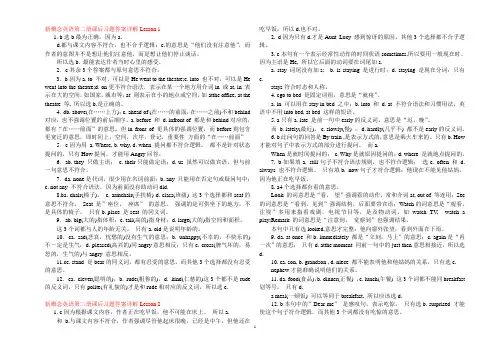
新概念英语第二册课后习题答案详解Lesson 11. b选b最为正确。
因为a.d.都与课文内容不符合,也不合乎逻辑;c.的意思是“他们没有注意他”,而作者的意图并不是想让他们注意他,而是想让他们停止谈话。
所以选b. 最能表达作者当时心里的感受。
2.c其余3个答案都与原句意思不符合。
3.b因为a. to 不对,可以是He went to the theatre;c. into 也不对,可以是He went into the theatre;d. on更不符合语法,表示在某一个地方用介词in 或at, in 表示在大的空间,如国家,城市等,at 则表示在小的地点或空间,如atthe office, at the theatre 等, 所以选b.是正确的。
4.db. above(在……上方);c. ahead of (在……的前面,在……之前)不和behind 对应,也不强调位置的前后顺序。
a. before 和d. infront of 都是和behind对应的,都有“在……前面”的意思。
但in front of 更具体的强调位置,而before则包含更宽泛的意思,即时间上,空间,次序,登记,重要性方面的“在……前面”5.c因为用a. Where, b. why, d. when 提问都不符合逻辑,都不是针对状态提问的,只有How提问,才能用Angry回答。
6.ab. they 只做主语;c. their只能做定语;d. us 虽然可以做宾语,但与前一句意思不符合。
7.da. none是代词,很少用在名词前面;b. any 只能用在否定句或疑问句中;c. not any 不符合语法,因为前面没有助动词did.8.ba. chair(椅子),c. armchair(手扶椅) d. class(班级) 这3个选择都和seat的意思不符合。
Seat是”座位,座席”的意思。
强调的是可供坐下的地方,不是具体的椅子。
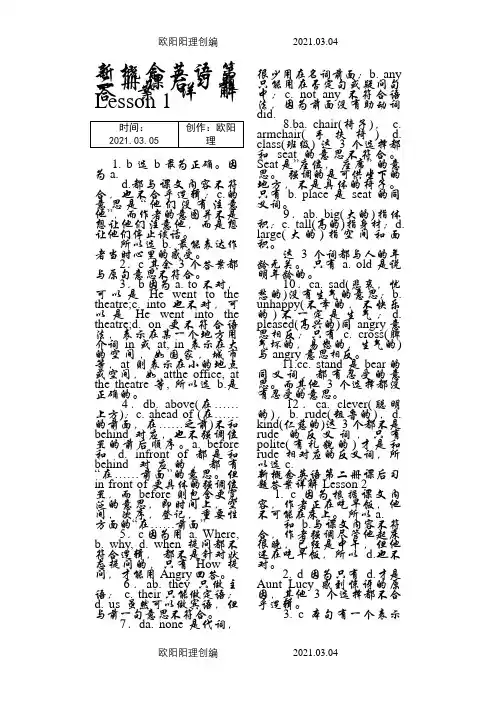
新概念英语第二册课后习题答案详解Lesson 11. b选b最为正确。
因为a.d.都与课文内容不符合,也不合乎逻辑;c.的意思是“他们没有注意他”,而作者的意图并不是想让他们注意他,而是想让他们停止谈话。
所以选b. 最能表达作者当时心里的感受。
2.c其余3个答案都与原句意思不符合。
3.b因为a. to 不对,可以是He went to the theatre;c. into 也不对,可以是He went into the theatre;d. on更不符合语法,表示在某一个地方用介词in 或at, in 表示在大的空间,如国家,城市等,at 则表示在小的地点或空间,如atthe office, at the theatre 等, 所以选b.是正确的。
4.db. above(在……上方);c. ahead of (在……的前面,在……之前)不和behind 对应,也不强调位置的前后顺序。
a. before 和 d. infront of 都是和behind对应的,都有“在……前面”的意思。
但in front of 更具体的强调位置,而before则包含更宽泛的意思,即时间上,空间,次序,登记,重要性方面的“在……前面”5.c因为用a. Where, b. why, d. when 提问都不符合逻辑,都不是针对状态提问的,只有How提问,才能用Angry回答。
6.ab. they 只做主语;c. their只能做定语;d. us 虽然可以做宾语,但与前一句意思不符合。
7.da. none是代词,很少用在名词前面;b. any 只能用在否定句或疑问句中;c. not any 不符合语法,因为前面没有助动词did.8.ba. chair(椅子), c. armchair(手扶椅) d. class(班级) 这3个选择都和seat的意思不符合。
Seat是”座位,座席” 的意思。
强调的是可供坐下的地方,不是具体的椅子。
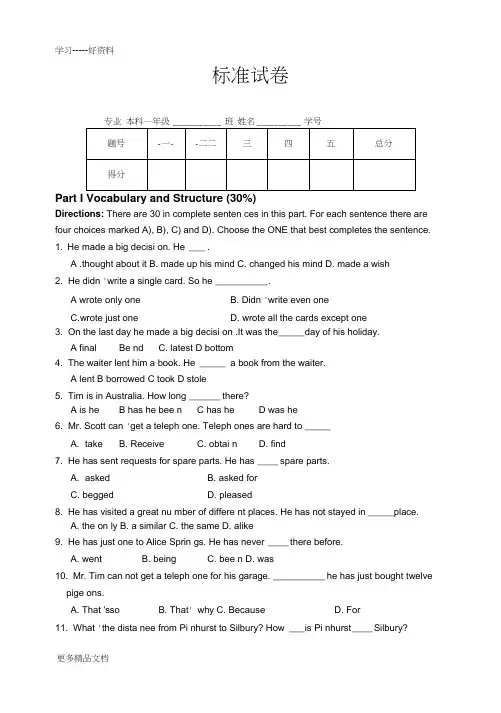
更多精品文档 学习-----好资料 标准试卷
专业 本科—年级 ___________ 班 姓名 __________ 学号 题号 -一- -二二 三 四 五 总分
得分 Part I Vocabulary and Structure (30%) Directions: There are 30 in complete senten ces in this part. For each sentence there are four choices marked A), B), C) and D). Choose the ONE that best completes the sentence. 1. He made a big decisi on. He ___ . A .thought about it B. made up his mind C. changed his mind D. made a wish 2. He didn 'write a single card. So he __________ . A wrote only one B. Didn 'write even one C.wrote just one D. wrote all the cards except one 3. On the last day he made a big decisi on .It was the _____ day of his holiday. A final Be nd C. latest D bottom 4. The waiter lent him a book. He _____ a book from the waiter. A lent B borrowed C took D stole 5. Tim is in Australia. How long ______ there? A is he B has he bee n C has he D was he 6. Mr. Scott can 'get a teleph one. Teleph ones are hard to _____ A. take B. Receive C. obtai n D. find 7. He has sent requests for spare parts. He has ____ spare parts. A. asked B. asked for C. begged D. pleased 8. He has visited a great nu mber of differe nt places. He has not stayed in _____ place. A. the on ly B. a similar C. the same D. alike 9. He has just one to Alice Sprin gs. He has never ____ there before. A. went B. being C. bee n D. was 10. Mr. Tim can not get a teleph one for his garage. __________ he has just bought twelve pige ons. A. That 'sso B. That' why C. Because D. For 11. What 'the dista nee from Pi nhurst to Silbury? How ___ is Pi nhurst ____ Silbury?学习 -- 好资料 A. long ago... till B. long... away C. Away... till D.far...from
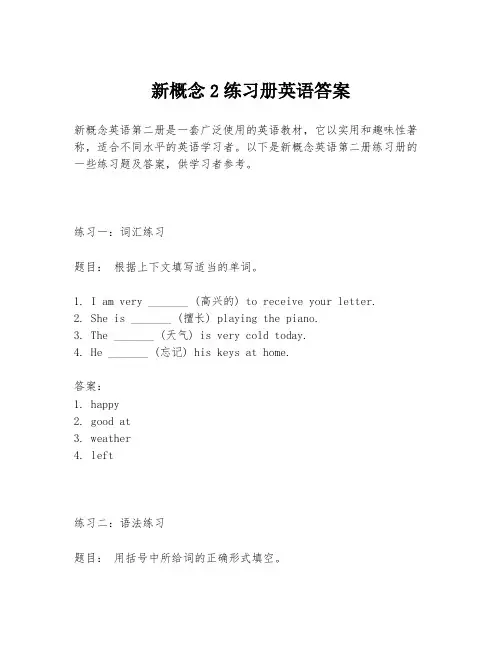
新概念2练习册英语答案新概念英语第二册是一套广泛使用的英语教材,它以实用和趣味性著称,适合不同水平的英语学习者。
以下是新概念英语第二册练习册的一些练习题及答案,供学习者参考。
练习一:词汇练习题目:根据上下文填写适当的单词。
1. I am very _______ (高兴的) to receive your letter.2. She is _______ (擅长) playing the piano.3. The _______ (天气) is very cold today.4. He _______ (忘记) his keys at home.答案:1. happy2. good at3. weather4. left练习二:语法练习题目:用括号中所给词的正确形式填空。
1. She _______ (be) a teacher since 2010.2. I _______ (not finish) my homework yet.3. They _______ (go) to the park if it _______ (not rain) tomorrow.4. He _______ (be) to Paris three times.答案:1. has been2. haven't finished3. will go, doesn't rain4. has been练习三:阅读理解题目:阅读下面的文章,然后回答问题。
文章:Tom is a young man who loves to travel. Last year, he went to Paris for the first time. He visited the Eiffel Tower and the Louvre Museum. He also enjoyed the French cuisine. Tom was amazed by the beauty of the city and the friendliness of the people. He plans to return to Paris next year.问题:1. Who is Tom?2. Where did Tom go last year?3. What did he do in Paris?4. What does Tom think of Paris?答案:1. Tom is a young man who loves to travel.2. Tom went to Paris last year.3. He visited the Eiffel Tower and the Louvre Museum, and enjoyed the French cuisine.4. Tom thinks Paris is beautiful and its people are friendly.练习四:写作练习题目:写一篇短文,描述你上个周末的活动。
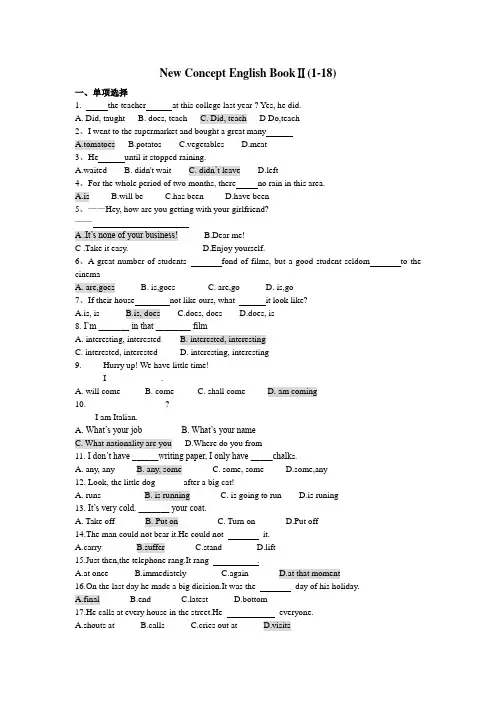
New Concept English BookⅡ(1-18)一、单项选择1. the teacher at this college last year ? Yes, he did.A. Did, taughtB. does, teachC. Did, teach D Do,teach2、I went to the supermarket and bought a great manyA.tomatoesB.potatosC.vegetablesD.meat3、He until it stopped raining.A.waitedB. didn't waitC. didn’t leaveD.left4、For the whole period of two months, there no rain in this area.A.isB.will beC.has beenD.have been5、——Hey, how are you getting with your girlfriend?——A .It’s none of your business! B.Dear me!C .Take it easy. D.Enjoy yourself.6、A great number of students fond of films, but a good student seldom to the cinemaA. are,goesB. is,goesC. are,goD. is,go7、If their house not like ours, what it look like?A.is, isB.is, doesC.does, doesD.does, is8. I’m _______ in that ________ filmA. interesting, interestedB. interested, interestingC. interested, interestedD. interesting, interesting9. ------ Hurry up! We have little time!------ I ____________.A. will comeB. comeC. shall comeD. am coming10. -------_____________?-------I am Italian.A.What’s your jobB. What’s your nameC. What nationality are youD.Where do you from11. I don’t have ______writing paper, I only have _____chalk s.A. any, anyB. any, someC. some, someD.some,any12. Look, the little dog ______after a big cat!A. runsB. is runningC. is going to runD.is runing13. It’s very cold. _______ your coat.A. Take offB. Put onC. Turn onD.Put off14.The man could not bear it.He could not it.A.carryB.sufferC.standD.lift15.Just then,the telephone rang.It rang .A.at onceB.immediatelyC.againD.at that moment16.On the last day he made a big dicision.It was the day of his holiday.A.finalB.endtestD.bottom17.He calls at every house in the street.He everyone.A.shouts atB.callsC.cries out atD.visits18.The detectives were a valuable parcel of diamonds.A.expectingB.waitingC.expecting forD.expecting to19.The man is fond of gardens. .A.They like himB.They like to himC.He likes themD.He likes they20.How many times did the clock .A.hitB.beatC.knockD.strike二、用over, between, along, in front of, behind, 或across 等介词或介词短语填空26. A lot of birds are flying ___over____ the river.27. The teacher is standing _____in front of_______ the blackboard.28. I am running __along_____ the Great Wall(长城).29. They are swimming __across____ the river.30. I am sitting ____between_____my brother and my sister.三、用所给单词的适当形式填空:31、He is not very friendly (friend) towards newcomers(新来的).32、She slammed the telephone down angrily (angry).33、It was a sudden decision (decide)34、She works for that restaurant as a waitress (waiter)35、She is very excited (exciting) about winning the first prize.36、What have you been done lately (late).37、We are very pleased (please) with our new house.38、She rarely ( rare) visited her aunt.39、“What do you want?”She asked rudely (rude)40、I had a long conversation (converse) with her the other day(不久前一天).四、英汉互译41.“不关你的事”,那个男的毫不客气地说,“这是一个私人间的对话!”“It’s none of your business,” the young man said rudely. “This is a private conversation!”42.一个好客的服务员教了我几句意大利语。
新概念英语第二册综合水平测试题一、根据音标写单词(10分)1. [r?'mɑ?k]?2. [r?'ma?nd]3. [gl?m(p)s]4. [fla?t]?5. ['f?r?st]6. ['v?l?d??]7. [d?'sk?v?]8. [s?'d?est]9. [k?'lekt]10. [swi?p]11. [r?'w??d]12. [spe?s]13. [k??z]14. ['f??g?] 15. ['k?nf?d(?)nt]? 16. [?k'spl???(?)n]17. [sm??k]18. [?n'kri?s]19. ['eksp??t]20. ['fju?t??]?二、单项填空(20分)21. It’s interesting, but ________ difficult for me.33. I’d like ________ TV, but my father enjoys _________ newspapers.A. watching, readingB. seeing, seeC. to see, seeD. to watch, reading34. His __________ says it’s 7:00 pm.A. beltB. walletC. watchD. ring35. I think the TV show is interesting. Do you ________ me?A. likeB. agreeC. agree toD. agree with36. —I love Sports News. What about you?—__________.A.I did, tooB.I do, eitherC.I do, tooD. I love to37. —Welcome to Beijing!—__________.A. Not at allB. That’s all rightC. GoodbyeD. Thank you38. Nina’s home is ___________ from here, so she doesn’t have to take the bus.A. five minutes’ walkB. twenty-kilometerC. two hours by busD. two hours39. He is very tired. He doesn’t want to do ___________.A. somethingB. nothingC. everythingD. anything40. I found it _______ to work out this math problem in one minute.A. easyB. easilyC. quicklyD. hardly三、完型填空(10分)countries.came to China. This was her first time to China and she wanted to 43his car, so today he has to take a bus to his office.The meeting is over. When he goes out of the warm office, it begins to snow. He wants to have some warm food and soup first. Most restaurants are full of people and he has to go into a small one.The waiter shows(出示) him the menu(菜单).“Some hot soup, please,” says Mr. Jackson.Later, the waiter brings the soup to him. When Mr. Jackson is drinking, he finds something in it.“Come here, boy,” he says. “Look, there is a hair in my soup!”The waiter says, “it’s usually a fly(苍蝇) in the soup, I remember.”51. Mr. Jackson usually goes home ____________.A. by busB. by carC. by bikeD. on foot52. __________, so Mr. Jackson has to stay in the office.A. There is no busB. There is a very important meetingC. Something is wrong with his carD. It is very cold outside53. The last bus leaves at ___________.A.7:30B.7:45C.7:55D.8:0554. Mr. Jackson wants to have some hot soup first because ___________.A. the restaurant is very warmB. he is hungryC. there are few people in the restaurantD. he feels cold after he leaves his office55. The waiter’s words mean that __________.收音机).Girl 1: Hi, Vera. How was your vacation?Vera: It was great.Girl 1: Where did you go?Vera: 61Girl 1: Really? Wow! What did you do there?Vera: Well, we went to a lot of museums.Girl 1: Oh, how were they?Vera: 62 But they were also very crowded.Girl 1: Did you go shopping?Vera: 63Girl 1: How were the stores?Vera: Oh, they were very expensive.Girl 1: And how were the people? Did you meet any Japanese people?Vera: 64 My parents have some Japanese friends, and we had dinner at their house.Girl 1: How was the food?Vera:65I love Japanese food!78. My English teacher went to the movies with her sister. (改为一般疑问句)_________ your English teacher ___________ to the movies with her sister?79. 如果你当时不赶紧的话,你就会赶不上火车的。
新概念第二册1-20课练习卷(附答案卷)1.XXX at this college last year。
Yes。
he did.2.I went to the XXX.3.XXX it ped raining.4.For the whole d of two months。
there has been no rain in this area.5.Take it easy.6.A great number of students are fond of films。
but a good student seldom goes to the cinema.7.If their house is not like ours。
what does it look like?8.I'm XXX.9.I am coming.10.What is your n?I am Italian。
My name is [Name]。
I work as a [Job]。
I come from Italy.11.I don't have any writing paper。
but I do have some chalks.12.Look。
the little dog is running after a big cat!13.It's very cold。
Put on your coat.14.The man could not bear it。
He could not stand it.15.Just then。
the XXX.16.On the final day of his holiday。
he made a big n.17.He calls at every house in the XXX.18.XXX.19.The man XXX.20.How many times did the clock chime?35.XXX.36.What have you been doing lately?37.We are very pleased with our new house.38.She rarely visited her aunt.39."What do you want?" she asked rudely.40.Not long ago。
新概念英语第二册课后答案Lesson1选 b 最为正确。
因为. 都与课文内容不符合,也不合乎逻辑; c. 的意思是“他们没有注意他”,而作者的意图并不是想让他们注意他,而是想让他们停止谈话。
所以选 b. 最能表达作者当时心里的感受。
2.c其余 3 个答案都与原句意思不符合。
3.b因为不对,可以是Hewenttothetheatre; 也不对,可以是Hewentintothetheatre;更不符合语法,表示在某一个地方用介词in 或at,in 表示在大的空间,如国家,城市等,at 则表示在小的地点或空间,如attheoffice,atthetheatre 等, 所以选 b. 是正确的。
4.d(在⋯⋯上方);(在⋯⋯的前面,在⋯⋯之前)不和behind 对应,也不强调位置的前后顺序。
和都是和behind 对应的,都有“在⋯⋯前面”的意思。
但infrontof 更具体的强调位置,而before 则包含更宽泛的意思,即时间上,空间,次序,登记,重要性方面的“在⋯⋯前面”5.c因为用,, 提问都不符合逻辑,都不是针对状态提问的,只有How提问,才能用Angry 回答。
6.a 只做主语;只能做定语;虽然可以做宾语,但与前一句意思不符合。
7.d是代词,很少用在名词前面;只能用在否定句或疑问句中;不符合语法,因为前面没有助动词did.(椅子),(手扶椅)(班级)这3个选择都和seat 的意思不符合。
Seat是”座位,座席”的意思。
强调的是可供坐下的地方,不是具体的椅子。
只有是seat 的同义词。
9.a(大的)指体积;(高的)指身材;(大的)指空间和面积。
这 3 个词都与人的年龄无关。
只有是说明年龄的。
10.c(悲哀,忧愁的)没有生气的意思;(不幸的,不快乐的)不一定是生气;(高兴的)同angry 意思相反;只有(脾气坏的,易怒的,生气的)与angry 意思相反。
是bear 的同义词,都有忍受的意思。
而其他 3 个选择都没有忍受的意思。
归总标准试卷专业本科年级班姓名学号题号一二三四五总分得分Part I Vocabulary and Structure (0%)Directions: There are 0 incomplete sentences in this part. For each sentence there are four choices marked A), B), C) and D). Choose the ONE that best completes the sentence. . He made a big decision. He .精 A .thought about it B. made up his mind C. changed his mind D. made a 品学wish习资. He didn ? t write a single card. So he .料, A wrote only one B. Didn ? t write even one名师 C.wrote just one D. wrote all the cards except one纳. On the last day he made a big decision. It was the day of his holiday.结 A final Bend C. latest D bottom4. The waiter lent him a book. He a book from the waiter.A lentB borrowedC tookD stole5. Tim is in Australia. How long there?A is heB has he beenC has heD was he6. Mr. Scott can ? t get a telephone. Telephones are hard toA. takeB. ReceiveC. obtainD. find7. He has sent requests for spare parts. He has spare parts.A. askedB. asked forC. beggedD. pleased8. He has visited a great number of different places. He has not stayed in place.A. the onlyB. a similarC. the sameD. alike9. He has just one to Alice Springs. He has never there before.A. wentB. beingC. beenD. was10. Mr. Tim can not get a telephone for his garage. he has just bought twelvepigeons.A. That ?s soB. That ?s whyC. BecauseD. For11. What ?s the distance from Pinhurst to Silbury? How is Pinhurst Silbury?品习结A. l ong ago... tillB. long... awayC. Away... tillD.far...from12. Urgent messages are important, so they must be sent .A. quicklyB. slowlyC.by handD. largely13. Mr. Button ? s telephone service is private. It is .A. generalB. spareC. secretD. his own14. She gaveA. to him a mealB. a meal for himC. him to a mealD. a meal to him15. Everyone knows him. know him.A. The allB. EachC. EveryD. All they16. You can have a meal .A. only in the morningB. at any timeC. only at middayD.only in the evening精7.All the housed in our are the same age and size.学 A. street B. way C. road D. route资料8. Joe?s garden is the best in the town. It?s the best them all.,名 A. in B of C. for D by师归9. , it is an important book.纳总 A. By the way B. On the way C. In the way D. In a way20. What ,s it ? A clavichord.A. told B said C called D spoken21. The family have had he clavichord many years.A. since B for C from D by22. I was looking for it, the inn-keeper came in.A. BecauseB. WhileC. ButD. Even if23. They are not allowed to watch TV the week.A. on B .at C.during D. for4. does he call? Once a month.A. How seldomB.How longC. How soonD. How often25. The detective were a valuable parcel of diamonds.A. expectingB. waitingC. expecting forD. expecting to26. Someone had filled the parcel with stones and sand. It was stones and sand.A. full withB. full ofC. full byD. full in27. Two men took the box off the plane. They .A. took off itB. it took offC. took offD. took it off28. The thieves wanted to the diamonds.A. robB. stealC. take fromD. take to料名29. Joe wins every time. He always Bill Frith.A. winsB. beatsC. gainsD. earns30. Mary ?s garden is interesting. She is in gardening.A. interestingB. interestC. interestinglyD. interestedPart II Translation (0%)Directions: Translate the following phrases into Chinese or English.31. 到现在为止 6.it ?s none of your business.32. 我不能忍受7.a few words33. 多么糟糕地一天! 8. turn around34. 脱下外套9.Dear me!35. 许多(修饰复数可数名词)40. in the centre of精Part III Fill the blanks with prepositions( 介词) (0%)品学 4. He went America six months ago.习资 4. He will go there air., 4. Wednesday evening, we went to the Town Hall.师归44. return for this, the bagger stood on his head and sang song.纳总45. Please write an essay English.结Part IV Reading Comprehension (0%)Directions: There are passages in this part. Each passage is followed by some questionsor unfinished statements. For each of them there are four choices marked A), B) C) and D).You should decide on the best choice and mark the corresponding letter on the AnswerSheet with a single line through the center.Passage OneOne day a big rock (岩石)fell down from a mountain. The rock stopped in the middle of the road in a village. It was like a big ball. Some of the strongest men in thevillage tried to move the rock. But no matter how hard they tried, they couldn't move itaway. They tried to push it; they tried to roll it and they tried to pull it with a rope, butnothing worked."Well" they agreed, "there's nothing we can do about it. We'll have to build another road. "At this time, a young boy of about years old said, "Excuse me, sirs, but I think Ican help you move the rock. ""You?" they shouted, "What are you talking about? All of us have just tried and we学can't move it at all. ” The men all laughed at the boy.The next morning some people came into the street. One of them shouted, "The rock is gone!" More people ran out into the street to see for themselves. It was true, and no one could see it anywhere."It is impossible, where has it gone?" they said. The boy stood out, saying "I did it last night. I dug a deep hole next to the rock and the rock rolled down into the hole by itself. Then I covered it with earth. "36. Where was the big rock from?A. a streetB. a mountainC. a hillD. a tree37. Why did the people in the village want to move the rock away? Because .A. it was in the middle of the roadB. it was on the mountainC. they didn't like the rockD. they wanted to build a road38. What did the people decide to do when they were not able to move the rock away?精They decided to品 A. find someone stronger to help them B. ask a little boy of to help them习资 C. build a nother road D. break the rock料,9. Why did the people laugh at the boy? They t hought that .名师 A the boy was too weak to move the rock away归纳 B the boy was so strong that he could move the rock总结 C. the boy was very helpfulD. it was easy for him to move the rock40. The next morning the people in the village found the rockA. disappearedB. was still thereC. was back on the mountain againD. was rolling down from the mountainPassage TwoSome ants (蚂蚁)make their homes under a stone. If the weather is warm, you may seemany ants under the stone. If the weather is cold, many ants will be in their house under theground.Most of the ants are workers. They are very busy. They look for food and take care of the young ants. Each family of ants has a queen ant (蚁后). The queen ant doesn't work.She is important because she lays eggs. Those eggs will become baby ants.There are many kinds of ants in America. One kind of these is very strong. People are afraid of it, and animals are afraid of it, too.These ants move in groups. They eat all the animals on their way. They can kill and eat elephants, and they can eat wooden houses. When the ants come near, people leave theirhomes. But people are sometimes glad after the ants pass through, because they will see noother insects or snakes.41. Where can you find ants on warm days?A. Under the ground.B. On the ground.C. Inside people's houses.D. Under a stone.42. Why is a queen ant more important than a worker ant? BecauseA. a queen ant produces the youngB. a queen ant is stronger than all the other family membersC. a queen ant finds food for all the other family membersD. a queen ant does more work than all the other family members43. Where can you find many kinds of ants according to the passage?A. In America.B. In China.C. In Canada.D. In Britain.44. Why are people glad after the dangerous ants pass through?精 A. Because they are gone B. Because they are not dangerous any品学more习资 C. Because there are no other insects or snakes D. Because the ants can be eaten料,45. Which of the following is true?名师 A. People are not afraid of any kind of ant.归纳 B. Big animals are not afraid of any kind of ant.总结 C. An elephant can kill and eat a kind of very strong ant.D. One kind of ants moves in groups.Passage ThreeTom Green spent his 4th birthday the other day and some reporters visited him to findout the secret of a long life.“The secret of a long life is happiness,”Green said.“If you are happy,you w long time. ”“Are you married?”a reporter asked.“Yes,”Green answered.“I married my when I was 0. If you are happily married, you will live better. But for (要不为)my thirdwife, I would have died years ago. ”“What about smoking and drinking?”another reporter asked.“Yes,they are important,”Green said.“Don?t smoke at all and you will feel well.D r i l n a k s s t w e s o og fwine a day and you will be healthy and happy. ”46. Some reporters visited Green becauseA. he did something peculiarB. he was a friend of themC. he had lived much longer than most peopleD. he had married three times纳结47. Green thought that was the most important to life.A. his third wifeB. gladC. happinessD. smoking48. Green thought his third wife helped him to live years longer.A. B.4 C.6 D.849. The writer wants to tell usA. drinking a great deal is good for our healthB. drinking within a limit is helpfulC. smoking and drinking are indispensable (不可缺少地)to good healthD. we should quit smoking or drinking.50. The best title for this passage isA. Drinking and SmokingB. The Secret of a Long LifeC. Happiness in LifeD. Astonished Reporters精Part V Writing (0%)品学Directions: For this part you are allowed thirty minutes to write a composition on the topic 习资The Use of Computers in Schools . Your composition should be no less than 0 words 料,and based on the outline (given in Chinese) below:名师46. 学生越来越多地使用电脑地好处。
新概念英语第二册学习情况评估试卷及答案 Ⅰ. Chose one answer from the four choices marked A, B, C and D that best completes the sentence..
1. We hadn’t met for nearly 20 years, but I recognized him ______ I saw him in the street. A) at once B) the moment C) at first D) right after 2. Prof. Lee, who teaches English literature at the California State University, divides his time ______ teaching, writing and lecturing.
A) during B) into C) among D) between 3. Some of this meat came from Canada. How about _____ A) another B) the other C) others D) the rest 4. As far as I know, Charles Babbage is generally considered ______ the first computer. A) to have invented B) having invented C) to invent D) inventing 5. The food she has prepared for the party is not enough, for there are _____ more people than she expected.
A) much B) too C) many D) so 6. You can borrow my tape-recorder _____ you return it to me tomorrow. A) unless B) as soon as C) until D) provided 7. Believe it or not, last year, Jack earned _____ his brother, who has a better position in a big company.
A) much as twice as B) as twice much as C) twice as much as D) as much twice as 8. The minister cited the latest crime figures _____ support of his argument that more police are needed.
A) in B) to C) with D) for 9. Many of us were reduced to tears _____ the sight of the hundreds of dead bodies. A) by B) at C) on D) in 10. The truth is that it is only by studying history _____ we can learn what to expect in the future. A) and than B) by which C) so D) that 11. I couldn’t help but _____ that it was a mistake to let him go alone. A) think B) thought C) to think D) thinking 12. In their hearts, some American women think it is men’s business to earn money and _____ to spend it.
A) they B) them C) their D) theirs 13. _____ day Bill was starting his motor-bike when his sister Mary came out and asked for a lift. A) Some B) The other C) Another D) On one 14. Last week I _____ an old friend of mine in the shopping mall. A) ran off B) ran away with C) ran into D) ran over 15. My uncle speaks English, French, Russian and Japanese. He is believed to have a gift _____ language.
A) about B) for C) with D) in 16. The problem had been solved many years ago,. What’s the point _____ talking about it now A) of B) to C) at D) on 17. In order to search for the escaped prisoner, the police decided to question _____ comes along this road.
A) who B) whom C) whoever D) whomever 18. Mrs. Parks, who lost both her husband and son during the Second World War, is now in poor health and expects to _____ care of.
A) be taking B) have taken C) take D) be taken 19. I agree with you that David is a clever guy, but I think he _____ very foolish just now. A) had been B) has been C) is being D) was 20. Emily wrote to ______ of her parents last week, but she has written to _____ of them this week.
A) both, either B) both, neither C) neither, both D) either, both 21. Please drop in whenever you can. I’d like to keep ____ touch. A) in B) to C) on D) with 22. When we sold our farm and moved to town, mother had decided _____ opening a day nursery.
A) to B) on C) in D) for 23. The medical record shows that it was the drug, not the disease, ______ killed him two years ago.
A) the effects of which B) the effects of it C) finally D) that 24. _____ that they’re young and inexperienced, they’ve done quite a good job. A) Being B) Provided C) Given D) Now 25. We haven’t seen our neighbors for over a week. They _____ on a trip abroad. A) could B) must go C) may have gone D) should have gone
Ⅱ. Chose one answer from the four choices marked A, B, C and D that best completes the passage.
__1__ the population of China There are more than a billion people in China, __2__ is almost one fifth of the world’s population. How to control the population growth is a big problem. Some people think __3__ the government to control the population growth. But I don’t quite agree _4__ them, because __5__ there is a way.
The question is that we should make it __6__ __7__. Our farmland is limited and many natural materials are becoming __8__ . We have already got too many mouths to feed. __9__ we control the population growth, many people will suffer __10__ or even die __11__ hunger. Too fast population growth has already done and will do great __12__ to our nation.
Though laws have been __13__ to control the population growth, in some places __14__ is done to carry out the law. We should make people __15__ that it is stupid and foolish __16__ them to